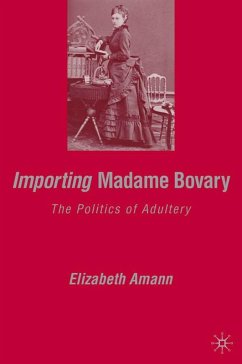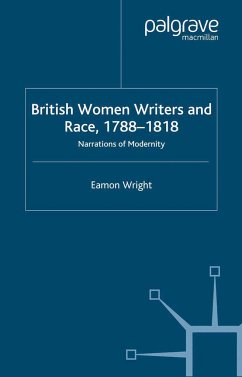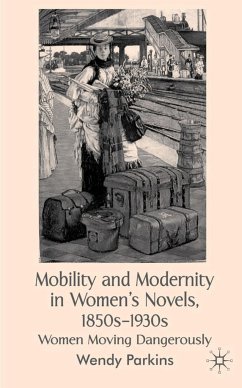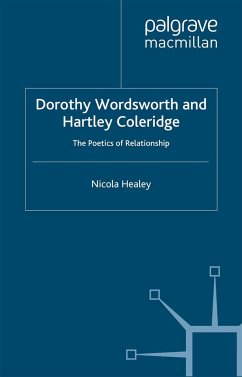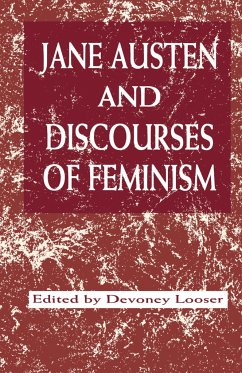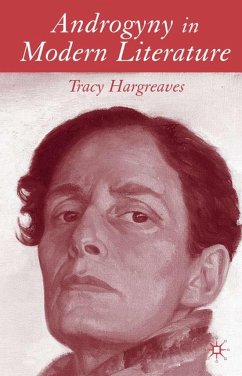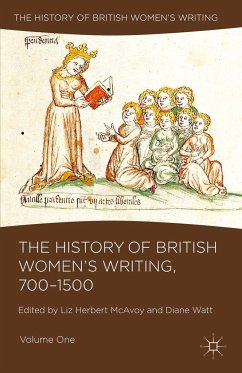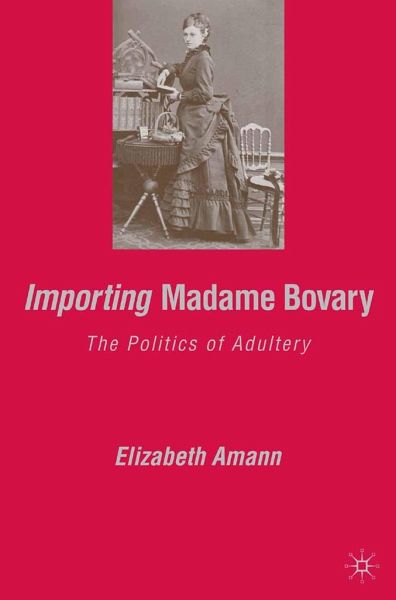
Versandkostenfrei!
Versandfertig in 6-10 Tagen
Weitere Ausgaben:

PAYBACK Punkte
19 °P sammeln!





After its succès de scandale in France in 1856, Flaubert's Madame Bovary was widely adapted, sometimes so closely they were dismissed as plagiarism yet they achieved canonical status in their national traditions. This study traces Madame Bovary's journey abroad and asks why the novel was given such import in foreign literatures.
ELIZABETH AMANN is an associate professor at Columbia University, USA, where she specializes in Nineteenth-century European literature. She has also taught at the University of Chicago and Yale University.
Produktdetails
- Verlag: Palgrave Macmillan / Palgrave Macmillan US / Springer Palgrave Macmillan
- Artikelnr. des Verlages: 978-1-349-53668-9
- 1st ed. 2006
- Seitenzahl: 277
- Erscheinungstermin: 15. Juni 2007
- Englisch
- Abmessung: 216mm x 140mm x 16mm
- Gewicht: 361g
- ISBN-13: 9781349536689
- ISBN-10: 1349536687
- Artikelnr.: 45082028
Herstellerkennzeichnung
Libri GmbH
Europaallee 1
36244 Bad Hersfeld
gpsr@libri.de
'A strikingly brilliant approach to influence and intertextuality, Importing Madame Bovary sheds new light on erotic play and its potential for socio-political upheaval in major French, Spanish and Portuguese novels from the nineteenth century. A remarkably sharp, exacting and insightful book.' - Francisco Caudet, Catedrático, Universidad Autónoma de Madrid
'Amann's Importing Madame Bovary is a finely crafted and clearly written comparative analysis of three major nineteenth-century novels of adultery: Flaubert's Madame Bovary, Eça de Queirós's O primo Basilio and Leopoldo Alas's (Clarín) La Regenta. Through masterly readings of these texts she intelligently argues and, moreover, convinces - that O primo Basilio and La Regenta
'Amann's Importing Madame Bovary is a finely crafted and clearly written comparative analysis of three major nineteenth-century novels of adultery: Flaubert's Madame Bovary, Eça de Queirós's O primo Basilio and Leopoldo Alas's (Clarín) La Regenta. Through masterly readings of these texts she intelligently argues and, moreover, convinces - that O primo Basilio and La Regenta
Mehr anzeigen
rather than being imitations of Flaubert's masterpiece are deliberate acts of appropriation by the Iberian authors. A groundbreaking study, Importing Madame Bovary brilliantly explores the textual dialogues among these three novels in order to reveal the historical context in which Flaubert, Eça de Queirós and Clarín inscribed in their novels. This book should be required reading for students of the nineteenth-century European realist novel in that it proves that a comparative cultural, historical, and textual reading is essential to understanding the dialogic nature of the adultery novel in France, Portugal and Spain.' - Alda Blanco, Professor of Spanish, University of Wisconsin-Madison
"Amann argues that some of the mostimportant 19th-century French, Spanish, and Portuguese adultery novels make allegorical references to the revolutionary struggles of 1848, to the breakdown of the alliance between the bourgeoisie and the proletariat, and to the rise of the French Second Empire. The contrast between the sentimentality of a tear-jerking narrative genre and its hidden political message is entirely unexpected. A smart, seductive book." - Thomas Pavel, Gordon J. Laird Distinguished Service Professor, University of Chicago
"This is a major accomplishment, a book so full of original insights and intelligent analysis that it will leap to the top of the pile of criticism on the nineteenth-century European novel. Amann has done a spectacular job of coaxing out of four major novels fresh ideas and smart commentary, and she provokes serious thinking on the part of her readers. While the main focus of the book is the reception/adaptation/'importation' of Flaubert's Madame Bovary into the Iberian Peninsula in the form of Eça de Queirós's O primo Basílio and Leopoldo (Clarín) Alas's La regenta, Amann also weaves into her discussion another text, Dumas's La dame aux camélias, which serves as a kind of ur-text to the discussion she lays out in dazzling detail." - David T. Gies, Commonwealth Professor of Spanish, University of Virginia
"Amann argues that some of the mostimportant 19th-century French, Spanish, and Portuguese adultery novels make allegorical references to the revolutionary struggles of 1848, to the breakdown of the alliance between the bourgeoisie and the proletariat, and to the rise of the French Second Empire. The contrast between the sentimentality of a tear-jerking narrative genre and its hidden political message is entirely unexpected. A smart, seductive book." - Thomas Pavel, Gordon J. Laird Distinguished Service Professor, University of Chicago
"This is a major accomplishment, a book so full of original insights and intelligent analysis that it will leap to the top of the pile of criticism on the nineteenth-century European novel. Amann has done a spectacular job of coaxing out of four major novels fresh ideas and smart commentary, and she provokes serious thinking on the part of her readers. While the main focus of the book is the reception/adaptation/'importation' of Flaubert's Madame Bovary into the Iberian Peninsula in the form of Eça de Queirós's O primo Basílio and Leopoldo (Clarín) Alas's La regenta, Amann also weaves into her discussion another text, Dumas's La dame aux camélias, which serves as a kind of ur-text to the discussion she lays out in dazzling detail." - David T. Gies, Commonwealth Professor of Spanish, University of Virginia
Schließen
Für dieses Produkt wurde noch keine Bewertung abgegeben. Wir würden uns sehr freuen, wenn du die erste Bewertung schreibst!
Eine Bewertung schreiben
Eine Bewertung schreiben
Andere Kunden interessierten sich für




